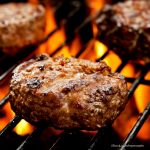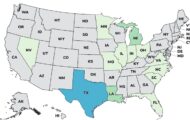Celebrate the Fourth of July this year without foodborne illness, with tips from the USDA about safe grilling. There are inherent risks that come with cooking in hot weather too. First, always wash your hands before cooking and handling and serving food. Handle raw meat with care, since it can be contaminated with pathogen bacteria such as E. coli, Salmonella, Listeria monocytogenes, and Campylobacter. Keep raw meats away from foods that are eaten uncooked such as raw fruits and vegetables. When you form hamburgers or season steaks, using a separate cutting board and plate. And wash your hands thoroughly with soap and water after touching uncooked meat and poultry. If you marinate the meat or poultry, keep the used marinade away from other foods, and discard it when you put the … [Read more...]
Unsafe Ways to Prepare Your Thanksgiving Turkey
Did you know that there are unsafe ways to prepare your Thanksgiving turkey? While we have covered prepping and cooking the turkey safely, including proper thawing and roasting to the correct temperature, there are other physical parts to the preparation to think about. First of all, the method you use for cooking your turkey is important. You can roast the turkey, grill it, or deep fry it. Roasting is the most common method, and it is the safest, both in terms of food safety and physical safety. Grilling is the next safest, as long as you keep an eye on the bird, understand the risks of grilling such as fire and burns, and use a food thermometer. Just never use a grill in a covered area, not even a breezeway or the garbage because you risk carbon monoxide poisoning. But deep … [Read more...]
Penn State Extension Offers Tailgating Food Safety Tips
It's football season! That means fans are grilling out and picnicking at stadiums. But do you know how to serve safe food? Penn State Extension is offering tailgating food safety tips to keep you and your friends safe. You can download a free brochure of these tips by Catherine Cutter, professor of food science in the College of Agricultural Sciences and Penn State Extension assistant director for food safety and qualify programs. Safety starts when preparing for your tailgating session. First, if you are going to grill meat, make sure it is properly defrosted. Never defrost meat on the counter or outside. Defrost it in the fridge, and allow enough time to make sure it's thawed. Prepare a handwashing station to take to the stadium. Set up a five gallon water container with a … [Read more...]
Summer Grilling Safety Tips From Consumer Product Safety Commission
Summer grilling safety tips from the Consumer Product Safety Commission will help prevent accidents and burns during this season. Gas and charcoal grills can present many risks, including burns, fire, and carbon monoxide poisoning. From 2016 through 2018, there were about 12 deaths per year involving these products. And last year, there were about 6,300 gas and charcoal grill-related injuries treated in emergency rooms. Before you light up the grill, check to see if your grill has been recalled. If it has, do not use it until it's been repaired or replaced. Then, check the grill to make sure there aren't any cracks or leaks. Hoses should be checked for brittleness, holes, cracks, and leaks. Never use grills indoors. In fact, don't even use your grill in your garage or a covered … [Read more...]
Is It Safe to Partially Cook Meat and Poultry Ahead of Time?
Labor Day is the last big grilling holiday of the summer season. Most Americans love to grill, and cook out whether at home or in a park. Grilling food safety tips are important for every person to know. But there's one question that is not often answered: Is it safe to partially cook meat and poultry ahead of time? Most people love to be able to prepare many foods ahead of time when they are entertaining. Salads, desserts, and side dishes are all easy to prepare ahead. But what about meats? While you can cut meat into serving sizes and marinate meats for added flavor and tenderness, you should never partially cook meat or poultry ahead of time to finish later, according to the CDC. This is not widely known and this fact is not often included in FDA or USDA grilling tips. The … [Read more...]
Little Known Safe Grilling Tips to Prevent Foodborne Illness
When it comes to summer grilling, we are bombarded with information about how to keep the food you are cooking safe. Everyone knows (or should know) about safe final internal temperatures, to wash your hands before cooking and after handling raw meats, and to follow expiration dates on these products. But there are little known safe grilling tips to prevent illness. For instance, did you know that you can get sick if you don't handle marinades properly? Any marinade that has come into contact with raw meat will instantly become contaminated with pathogens. Vinegar or lemon juice in marinade will not kill these pathogens. So if you are using a marinade, handle it carefully. If you want to use some for dipping or to marinate vegetables, make the marinade, reserve some in another bowl … [Read more...]
Do You Know If You Are Grilling Mechanically Tenderized Beef?
With grilling season upon us and the Fourth of July holiday next week, most Americans are taking to their outdoor grills. We grill everything from chicken wings to veggies to burgers to steaks. But do you know if you are grilling mechanically tenderized beef? There are several ways of tenderizing meat: marinating, the way you cut it after it's cooked, and mechanical tenderizing. Knowing if the meat you are grilling is mechanically tenderized can make the difference between enjoying a nice meal and getting sick. And there's a lot of mechanically tenderized beef out there: 6.2 billion servings of mechanically tenderized beef are served every year on American tables. The USDA is offering tips on how to protect yourself and your family while grilling. One section of that piece … [Read more...]
Charcoal Grill Safety Tips From Consumer Product Safety Commission
It's the first full da of summer, so it's appropriate that we discuss charcoal grill safety tips from the U.S. Consumer Product Safety Commission. The second part of this discussion will cover food safety when grilling, which mostly involves using a thermometer, safe final internal food temperatures, and washing plates and utensils while cooking. Charcoal bags now have a food safety label, indicating that the use of that product is a carbon monoxide hazard. Put bluntly, burning charcoal inside can kill you. This heat source gives off carbon monoxide as it burns, which has no odor. Never ever burn charcoal inside homes, vehicles, or tents. In fact, you shouldn't even grill on a porch that has a ceiling. Furthermore, do not bring a charcoal grill inside the house to use for … [Read more...]
Memorial Day Grilling Food Safety Tips From the USDA
Memorial Day is next Monday, so the USDA is offering Memorial Day grilling food safety tips, to pros and beginners alike for the long weekend. Rates of food poisoning and food poisoning outbreaks increase in the summer months because bacteria grow faster in warm weather. In addition, cooking and eating food outdoors can be risky because people are tempted to take shortcuts to food safety. Sandra Eskin, USDA's Deputy Under Secretary for Food Safety said in a statement, "Memorial Day marks the beginning of warmer weather and summer fun. Don’t let foodborne illness ruin the cookout –follow food safety guidelines like washing your hands, thoroughly cooking your food and checking food temperature with a thermometer." First, always use a food thermometer when you are cooking meat and … [Read more...]
Keep Your Backyard Barbecue Safe From Staphylococcus With Tips
The USDA is offering tips to help keep your backyard barbecue safe from Staphylococcus aureus bacteria this summer. Cooking outdoors presents special challenges, including grilling food to a safe internal temperature, and higher ambient temperatures. The press release focuses on Staphylococcus aureus, which sickens about 240,000 Americans every year. About 1,000 of those patients need to be hospitalized, and about six people die every year. A USDA scientist developed a test that detects the pathogen in foods, which is faster, more sensitive, and less expensive than other standardized tests. Reuven Rasooly, a chemist with the USDA's Agricultural Research Service (ARS) said in a statement, "The current test detects active toxin only 50 percent of the time compared to the test, … [Read more...]









